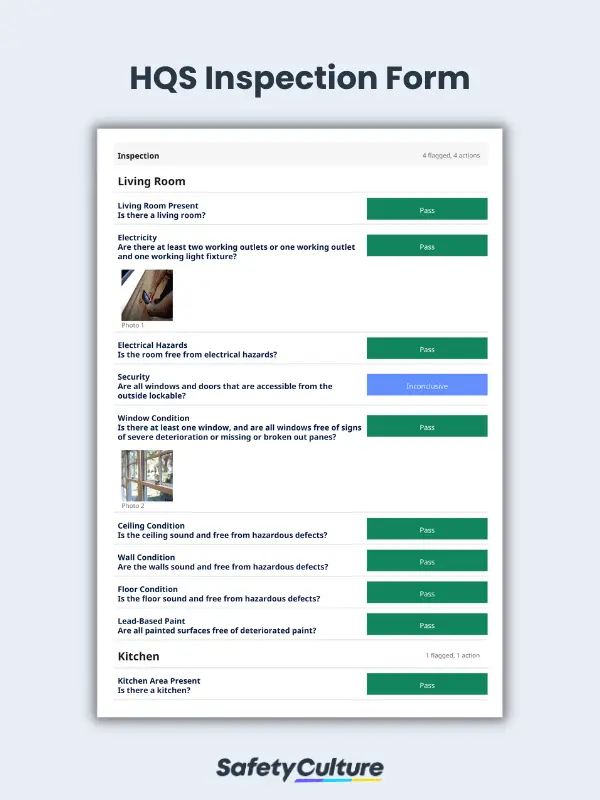What is HQS Inspection?
An HQS inspection is performed by inspectors from the Public Housing Agency (PHA) to determine if a residential unit meets the Housing Quality Standards (HQS)—Section 8 of the U.S. Housing Act of 1937, or the Rental Assistance Program, now called the Housing Choice Voucher Program (HCVP). HQS inspections are regularly conducted by the housing authority, but they are required at least once a year, whether tenant-based or project-based, and if it is determined that the landlord is not adequately maintaining the unit.
The Housing Quality Standards Inspection Process
In an effort to assist low-income families in leasing or purchasing decent, safe, and sanitary housing at an affordable cost, the U.S. Department of Housing and Urban Development (HUD) created housing quality standards as authorized by law, establishing the minimum requirements for any residential unit should meet before monthly Housing Assistance Payments (HAP) is provided through direct deposit from the local housing authority.
Here’s what property owners, managers, or landlords can expect for an initial HQS inspection or a pre-HAP contract inspection:
Before the HQS Inspection, be aware of the general HQS requirements. In addition to the building exterior, heating and plumbing, and general health and safety of the unit, housing quality standards should be met in the following areas:
- Sanitary facilities
- Food preparation and refuse disposal
- Space and security
- Thermal environment
- Illumination and electricity
- Structure and materials
- Interior air quality
- Water supply
- Lead-based paint
- Access
- Site and neighborhood
- Sanitary conditions
- Smoke detectors
During the HQS Inspection, the housing authority inspector will go through an inspection form to carefully assess whether the unit meets housing quality standards. If the inspector determines that all items meet the inspection criteria, he/she will rate “pass”, but if any item on the HQS inspection checklist is marked as “fail”, the unit automatically fails the entire HQS.
In the HQS inspection report, the inspector will specify the conditions that caused the unit to fail and indicate the necessary repairs to pass the HQS re-inspection. If the property owner or manager is present at the inspection, the inspector will also clearly identify the non-compliant item(s) and what should be done to rectify them.
Generally, the “inconclusive” rating is used when the tenant is not present at the inspection or when the inspector is unable to access the unit. Inconclusive item(s) in the HQS inspection form should be followed up by the inspector, so the landlord should notify the local housing authority inspections department as soon as these item(s) are in working condition.
After the HQS Inspection
- Make repairs to units that failed an inspection within the specified period
- Facilitate the HQS inspectors’ access to units for conducting re-inspections
- Comply with the terms of the Housing Assistance Payment (HAP) Contract
- Pay for any utilities which the property owner is responsible for
- Maintain units according to HQS and ensure continued compliance
Common HQS Inspection Failed Items
Usually, HCVP landlord hopefuls should correct failed items identified in the HQS inspection form within 30 days. Enumerated below is a non-exhaustive list of commonly failed inspection items in an east-coast county:
- Non-functional smoke detectors
- Missing or cracked electrical outlet cover plates
- No railings where required
- Peeling exterior and/or interior paint
- Trip hazards caused by floor coverings (carpets/vinyl)
- Cracked or broken window panes
- Inoperable burners on stoves or range hoods
- Missing burner control knobs
- Inoperable bathroom fan or lack of proper ventilation
- Leaking faucets or poor plumbing
- No temperature or pressure relief valves on water heaters
When the inspector detects emergency failed items during the HQS re-inspection, complaint inspection, or quality control inspection, property owners or managers should address them within 24 hours. The following emergency HQS fail items are based on the administrative plan of a city housing authority in the Midwest:
- Any property determined uninhabitable by a city agency, including those that are uninhabitable due to fire, flood, or other natural disaster
- Any condition that jeopardizes the security of the unit (e.g., missing or broken locks on exterior doors)
- Major plumbing leaks, waterlogged ceiling, or a floor in imminent danger of falling
- Natural or propane gas leaks or fuel oil leaks
- Any electrical problem or condition that could result in shock or fire
- A heating system (including cut-off of the utility used for heating) that is not capable of maintaining a minimum of 55 degrees Fahrenheit between September 15 and June 1
- Utilities (i.e., gas, electric or water) not in service
- Conditions that present the imminent likelihood of injury
- Unmovable obstacles that prevent safe entrance or exit from the unit
- Absence of a functioning toilet in the unit
- Backed-up sewer system in the unit
- Lack of at least one working smoke detector on each level of the unit
- Lack of a working carbon monoxide detector in an area with a fossil fuel burning system and on each level used for sleeping
- Fuel burning water heater or heating, ventilation, or cooling system with missing, damaged, improper, or misaligned chimney or venting



